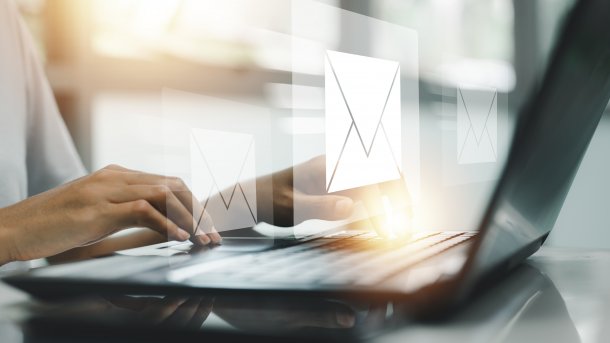Federal government: standard e-mail inbox is sufficient for electronic invoices
From 2025, companies subject to VAT will be obliged to be able to receive e-invoices. The provision of an e-postbox should be sufficient for this.

(Image: Day Of Victory Studio/Shutterstock.com)
Separate IT systems are not absolutely necessary for electronic invoicing. This is explained by the German government in its recently published answer to a question from the CDU/CSU parliamentary group in the Bundestag. "The provision of an e-mail inbox is sufficient for the receipt of an e-invoice," it says. However, the companies involved can also agree on other electronic transmission channels. However, according to the principles for the proper keeping and storage of books, records and documents in electronic form and for data access (GoBD), incoming electronic commercial or business letters such as e-invoices must also be stored in electronic form.
Companies subject to VAT in Germany must be able to receive e-invoices for domestic sales from the beginning of 2025. The content is presented in a structured, machine-readable XML data set, i.e. not on paper or in an image or PDF file. In particular, invoices in accordance with the XStandard and Zugferd format from version 2.0.1 generally represent "an invoice in a structured electronic format", explains the Federal Ministry of Finance (BMF) in a draft information letter to businesses. Collection claims in these two formats could therefore "meet the new VAT requirements for an e-invoice after December 31, 2024". The use of other European invoice formats such as FatturaPA (Italy) or Factur-X (France) could also be considered.
The BMF emphasizes that there is no transitional regulation for the receipt of an e-invoice. It must therefore be guaranteed from January 1, 2025. Receivables under 250 euros are an exception. E-invoices must be transmitted in electronic form. In addition to emails, electronic interfaces or online portals for downloading could be considered. Until the end of the calendar year 2026, other invoices can also be issued and transmitted, including in particular pure PDF files. For companies with a total annual turnover of less than EUR 800,000, this will even apply until the end of 2027. However, other invoices will be deemed "improper" in future and will therefore not entitle the recipient to deduct input tax.
SMEs still very unfamiliar with e-invoicing
The CDU/CSU parliamentary group is concerned that the EU has not yet agreed on the uniform VAT system planned by the Commission, which is creating legal uncertainty. In addition, "the sluggish processes" are likely to mean that "many companies have not yet converted their internal processes accordingly". According to a survey conducted by software company Sage among 9701 companies from seven major European countries in April, only four percent of SMEs have introduced electronic invoicing for business-to-business transactions, despite its many advantages. 6 percent of German participants did not see themselves implementing electronic invoicing until 2030. The biggest hurdle is integration into existing accounting or financial systems. 32 percent of German small and medium-sized companies say they are not yet familiar with e-invoicing.
"The federal government is not aware of the status of implementation work by German companies on the introduction of e-invoicing," according to a statement from Berlin. The scope, intensity and speed of implementation is a matter for businesses to decide on their own responsibility. In addition to the information letter, a catalog of questions and answers is also planned. The coalition has asked the government to provide a free offer for the creation and visualization of e-invoices by the end of 2024. However, after an intensive review, the BMF came to the conclusion that the state should not offer a service that competes with the private sector. Online services are – partly free – already available from private service providers.
(mma)